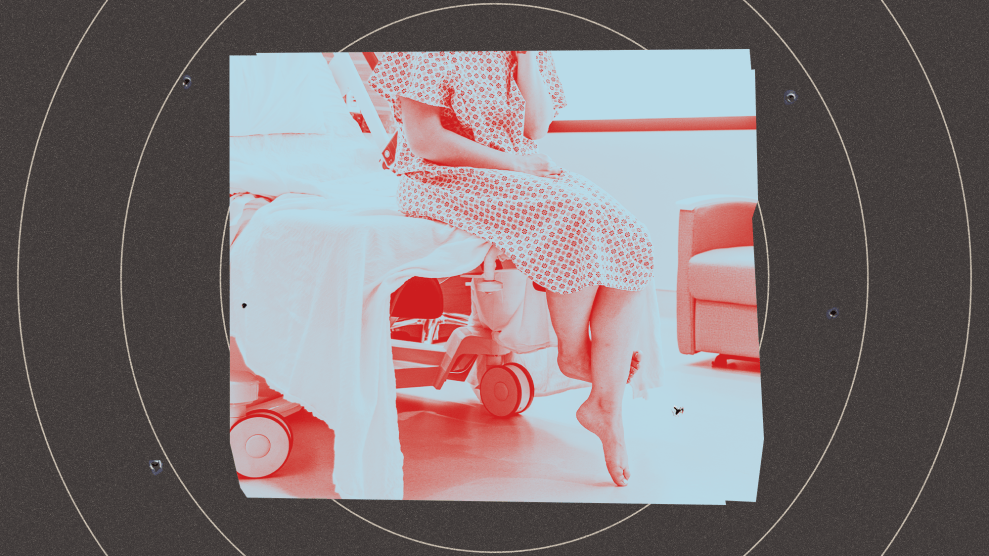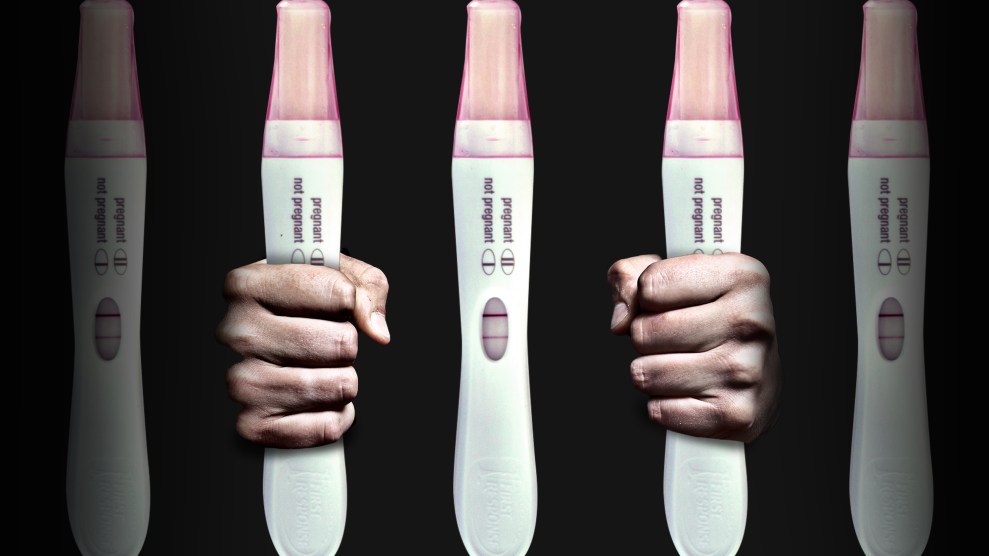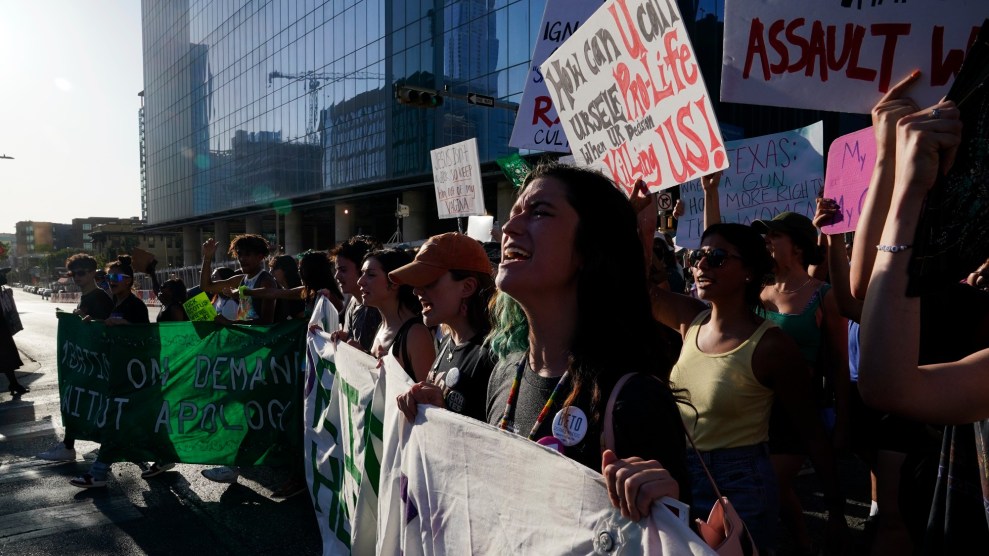
Mother Jones illustration; Getty
State bans on abortion criminalize providers, not patients. But the Supreme Court’s 2022 ruling overturning Roe v. Wade nonetheless appears to have emboldened zealous local prosecutors to target pregnant people for alleged crimes like “endangering” or “abusing” their fetus. In the year after the Supreme Court ruling, researchers at the legal nonprofit Pregnancy Justice documented at least 210 cases in 12 states in which pregnant people faced criminal charges for conduct associated with their pregnancy, stillbirth, miscarriage, or birth—more than in any other year since they started counting.
Now, in President Donald Trump’s second term, empowered anti-abortion politicians are pushing for more explicit efforts to punish pregnant people for how their pregnancies end. Just since the start of the year, lawmakers in Indiana, North Dakota, Oklahoma, South Carolina, and Texas have announced bills to classify abortion as homicide, paving the way for abortion patients to be charged with murder. “Even where the charge is murder, the provisions of this section shall apply if the victim is an unborn child and the defendant is the child’s mother,” reads the bill in Oklahoma. Trump, meanwhile, has issued an executive order that defines a person’s sex as beginning “at conception.” In doing so, lawyers for pregnant people say he is opening the door for federal agencies to treat embryos and fetuses as people with full legal rights—potentially endangering the rights and freedoms of pregnant people.
Catherine, a 31-year-old woman from Alabama, is one of the women criminalized on a pregnancy-related charge after Roe v. Wade was overturned. She had a stillbirth at home in 2021, and when she went to the hospital for emergency medical care, she was found to have a controlled substance in her system. Two years later, her local prosecutor charged her with the “chemical endangerment” of her “unborn child.” But the evidence showed that Catherine never knew she was pregnant, according to Pregnancy Justice senior staff attorney Emma Roth, and charges were dismissed in early 2024.
When Catherine and I spoke by Zoom in early January, a few inches of snow had coated the ground in the town where she’s lived all her life, and she was bundled in a pink sweatshirt reading, “God is still writing your story. Stop trying to steal the pen.” She is sharing her experience publicly, for the first time, so that people who find themselves facing similar charges know they are not alone. Her story has been edited and condensed.
I was rolling around in pain and didn’t know what was going on.
I was at home, lying in bed, going back and forth to the bathroom. I was thinking I was heavily constipated, at a dangerous level, because I was only eating fried foods from the restaurant I was working at. I couldn’t afford groceries.
I went to the bathroom, hoping I’d feel better. And then I found myself on the floor holding my baby, surrounded by blood.
It was world shattering.
I never knew that I was pregnant. My body never showed signs. I never gained weight. I felt completely normal.
I was confused, lost, and in shock, absolute shock. I called 911. Then I sat there, waiting. The EMTs and at least one cop came. They took her out of my arms, and took her down the stairs. Then they got me on a gurney and took me to the hospital.
There were nurses and doctors surrounding me, trying to ask me all kinds of questions. I remember them pushing on my stomach. There was one cop that just stuck around, and a bunch of investigators. I don’t remember the questions, just that they made me feel very insecure and not safe and violated. They took my phone. The nurses were asking me for my password.
“Addiction is deadly, and it’s a vicious cycle that entraps so many people. I was one of those people. “
The doctor came in and asked me if I knew what was in my system. Yes, I did. Addiction is deadly, and it’s a vicious cycle that entraps so many people. I was one of those people. It was a cycle of running from a feeling that I was trying to cover up with the substance. A bunch of emotions that I didn’t know how to handle, and a temporary fix that became the only problem.
When I was released from the hospital, the decision was made for me to go live with my parents. Everything changed—my circle, my friends, my atmosphere, my attitude. I went back to the restaurant, but not for long. They weren’t paying enough anyway, so I changed over to manufacturing. And I quit, cold turkey. I had this stubborn mentality: I can do it by myself. I started going to church, and Jesus is where the rest of my support system came from.
Grief was something I had to learn about, learn how to respond to. I named her when we were setting up the funeral: Isabella Grace. I never got to see her again. But I know exactly where she is now. She’s up there with my grandparents. She’s taken care of. She’s up there playing with other kids, kids like her.
It was a long time fighting. Some days, it was one hour at a time. But I was able to get through my days.
It was two years later that they pressed charges. I was starting to live again. Then local police came knocking on my door, at my parents’ house, one Sunday morning when I was getting ready for church. The officer told me that I was being indicted.
I was panicking. I didn’t expect it to be me, I guess. I was thinking, But I didn’t know I was pregnant. I was afraid that Alabama would be Alabama—there have been so many stories of dirty people in these systems who just throw women in jail. I was wondering, Why did they wait this long?
They took me to jail and booked me, but I bailed out not long after—I had the money to be able to do that. I went home and started talking to people, doing research, and then a family friend referred me to Pregnancy Justice.
They took care of all of it. I thought I was going to have to go to court a few times, but it ended up being otherwise. It was a few months before the case was dismissed. When I heard that news, it was the biggest weight off my shoulders. I could breathe.
It felt like I could finally move on, and move forward to the next step in my life: happiness. I got married last December. He has children, my bonus children. I’m slowly getting into higher positions at my job. I’m working my way up toward something.
There’s not a day that goes by where I don’t wish I could hold my child, not a day I don’t wish I could experience her milestones. Like playing in the snow, because we don’t get snow very often, but we did today. We’ve already been outside one time, and I hit my husband with some snowballs.
Being able to tell my story is also what the next step in my life looks like. It’s something I have wanted to do. I knew it was going to be hard. I knew there’d be times that I would cry, and hold back tears. But I want to tell my story to help women know that they are not alone, and they don’t have to go through these things thinking that it’s the absolute end of the world. Even if it’s just one woman out there, one person, I want to make sure that they should not feel ashamed for something that is out of their control.











